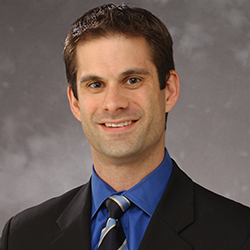Renowned Fetal Cardiology Experts Gather for Phoenix Symposium
Congenital heart defects (CHD) are the most common types of birth defect, affecting nearly one percent of births per year in the U.S. About 25 percent of these infants have critical CHD and will generally need surgery in their first year of life, according to the Centers for Disease Control and Prevention.

Today, physicians are able to work together to improve prenatal detection and outcomes of congenital heart disease, so children can grow and live healthier lives. This is one of the missions of the Phoenix Fetal Cardiology Symposium, which brought together physicians across multiple specialties to discuss important concepts in congenital heart disease, as well as the most recent advances in imaging, diagnosis and management of fetal cardiac abnormalities.
On October 27-31, 2017, Phoenix Children’s Hospital sponsored the 8th Annual Phoenix Fetal Cardiology Symposium at the Camby Hotel in Phoenix.
Dr. Lindblade, who is the Chair of the Symposium, said the conference is a great educational opportunity offered locally.
“Symposium faculty are prominent leaders in the field of fetal cardiology and fetal cardiac imaging, heralding from Phoenix Children’s Hospital and other prominent institutions across North America,” he said.
Physicians, nurses, sonographers and trainees attended. The symposium specifically targets those interested in fetal cardiac imaging, fetal therapeutic intervention and cardiovascular physiology. The intended audience included cardiologists, obstetricians, maternal fetal medicine specialists, neonatologists, radiologists, pathologists, surgeons, sonographers, nurses and trainees in these fields. Lectures, procedure demonstrations and interactive case study formats focused on expanding evidence-based care management strategies for clinical decision-making.
“The Symposium is the premiere fetal cardiology conference in North America,” Dr. Lindblade said. “It attracts over 250 attendees with an international audience from over 20 countries. There is so much offered in four and a half days.”
Attendees had the opportunity to present accepted scientific abstracts relevant to fetal cardiac disease. Selected attendees presented challenging fetal cardiac cases in sessions designed to be fun and interactive with the audience.
The symposium also had breakout workshops that include hands-on scanning of live models with fetal cardiac disease, fetal extra-cardiac anomalies and a 3-4D echo volume manipulation. An additional breakout session designed for fetal nurse coordinators focused on the role of the interdisciplinary team, which provides psychosocial support for the fetal cardiology family.
Two, half-day pre-conference tracks were also offered. Fetal and neonatal cardiac pathologic specimens were presented, showing their correlation with echocardiography, as well as giving attendees the opportunity to examine pathologic specimens. A second pre-conference course prepared sonographers for taking the ARDMS fetal echocardiography certification exam.
Media Contact:
Teresa Joseph
Phone: 602-827-2657
Topics
About the College
Founded in 2007, the University of Arizona College of Medicine – Phoenix inspires and trains exemplary physicians, scientists and leaders to advance its core missions in education, research, clinical care and service to communities across Arizona. The college’s strength lies in our collaborations and partnerships with clinical affiliates, community organizations and industry sponsors. With our primary affiliate, Banner Health, we are recognized as the premier academic medical center in Phoenix. As an anchor institution of the Phoenix Bioscience Core, the college is home to signature research programs in neurosciences, cardiopulmonary diseases, immunology, informatics and metabolism. These focus areas uniquely position us to drive biomedical research and bolster economic development in the region.
As an urban institution with strong roots in rural and tribal health, the college has graduated more than 1,000 physicians and matriculates 130 students each year. Greater than 60% of matriculating students are from Arizona and many continue training at our GME sponsored residency programs, ultimately pursuing local academic and community-based opportunities. While our traditional four-year program continues to thrive, we will launch our recently approved accelerated three-year medical student curriculum with exclusive focus on primary care. This program is designed to further enhance workforce retention needs across Arizona.
The college has embarked on our strategic plan for 2025 to 2030. Learn more.